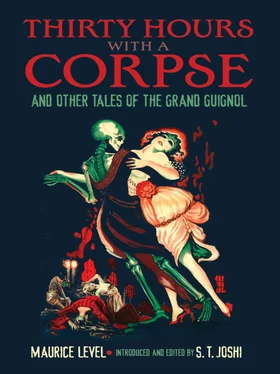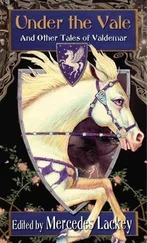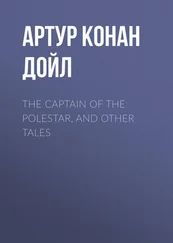The vision of himself evoked by this remembrance of himself as he used to be only grew more vivid as the years passed, and by slow degrees he became possessed by a longing either to become that old self again or to create another personality on the same lines. This longing sustained him through the long, dreary months of hardship in which he tried to save some money, economizing in food, sometimes even sleeping in the open. Halfpenny by halfpenny the little hoard accumulated, and at last he found himself in possession of a small sum. The enthusiasm of youth had come back to him; he took to making sketches, on a white wall, on the corner of a table, anywhere; everything he saw presented itself as a picture, and when he had a hundred francs he took the train and returned to France. Fifteen years had gone by since he left Paris. Who would remember him? Who would recognize him with his white hair, his long beard, his bent shoulders!
At first he hardly dared go out, but when confidence came his steps were drawn irresistibly toward the windows of the shops of the picture-dealers. There he saw new names, others that were familiar to him, and he found himself—he who had never in bygone days spoken of his talent—comparing himself with these painters and saying: “I can do better than that.”
He bought a canvas, some colors and brushes, and began to work in his little attic. He painted feverishly, hesitating as does a convalescent who fears movement after a long illness. When he had finished the picture he spent a whole day looking at it, asking himself:
“Is it good? Is it bad?”
He no longer felt the ability to criticize his own work. At length he pulled himself together, signed the picture with the first name that came into his head—Loriot—put the canvas under his arm and set off for a dealer’s shop. When he got there he was almost too agitated to speak, and he stammered as he said:
“I am a painter… I have no money… I wondered if you would buy a picture…”
“By whom?”
“By—by me.”
“What’s your name?”
“Loriot.”
“I’m sorry, but we are not buying anything just at present.” He grew pale and his throat was dry as he held out the canvas:
“You might at least look at it.”
The dealer glanced at it, came forward, took it in his hands, and called his partner.
“Look at this. What do you think of it?”
“Not at all bad.”
“You mean remarkably good,” said the other.
“Do you mean to say it’s the work of that old fellow?”
“Yes.”
They stood together near the mantelshelf examining it closely, and Miron heard one say:
“Astonishing—amazing! Do you know what it reminds me of ? It’s like the work of that scoundrel Miron, only ten times better.”
Miron, standing motionless in a corner near the door, drew himself up sharply.
“What did you say?” he asked.
The dealer smiled. “We weren’t talking of you. I was telling my partner that your work recalls that of a painter called Miron.”
Miron repeated reflectively:
“Miron… Miron…”
“I have a little thing of his here… Did you know him?”
“Yes,” murmured Miron.
“You have his style, his quality, but your work is better than his—though as a dealer I ought not tell you so.”
“Oh, no. It’s not better,” stammered Miron, his eyes on the picture they had taken from the window to show him.
“Yes, it is. Miron painted instinctively. You are a finished artist. The proof of my opinion is that I am prepared not only to take this picture of yours, but as many more as you can paint. I will sell them all for you. In two months your work will be known, in two years you will be celebrated, and I guarantee Miron will be quickly forgotten.”
Miron became paler as he listened. The words of high praise that would have delighted him in the old days now tortured him. He suddenly realized that all he cared for, all he respected in himself was the man he had been before his fall, the Miron he could no longer be, the Miron he had just heard condemned to death. What did the success or the failure of “Loriot” mean to him? He was not Loriot; Loriot was a stranger who was invited to come forward as the successful rival of his real self, an Unknown who would efface his name and what it stood for in the art world. The dealer went on talking, but he did not listen, did not hear. He imagined a buyer coming in and asking for a Miron, and this man replying, with his abominable smile, as he showed Loriot’s canvas:
“Miron?… Here’s something much better. Look at this.”
He could not stand the thought. He grieved for his dead self as a man mourns the loss of a last love.
“Let us come to terms,” the dealer was saying. “How much do you want?”
Miron raised his sad eyes, but made no reply. He did not seem to grasp the meaning of the question.
“Of course you understand that I can’t offer much for the first picture. It will be some time before people understand the difference between Loriot and Miron. Most buyers need guidance. But it will end by Miron’s going to the wall.”
The painter was still silent. The other believed he was considering the price.
“What do you say to—”
Miron stretched out his hand.
“I’d rather wait. I’ll come back some other time…”
“All right. But leave the picture. I’ll put it in the window instead of the Miron.”
“No,” said Miron.
“You are making a great mistake. A man doesn’t hesitate when a chance like this comes his way. Why, if I had offered that scoundrel Miron what I am offering you, it is more than likely he’d be here now, would never have done what he did.”
“That’s true,” Miron murmured. He was trembling.
“You can’t possibly refuse my offer. It would be childish.”
“I do refuse it. Give me the picture.”
“But I—”
“Give me the picture,” repeated Miron. His voice was hoarse, and there was a curious gleam in the depths of his eyes.
“It’s a great pity,” declared the dealer. “I repeat I would have made a bigger name for you than Miron made.”
“That’s true,” replied Miron for the second time, and he left the shop.
It was growing dark. Some people who were hurrying along stumbled up against him. It was a damp, dreary evening, very like the night of his flight. He stood on the curbstone, his picture in his hand. He held it for a second at arm’s length, then threw it in the road in front of a passing carriage.
“You’ve dropped something,” said a man.
“I know… it’s nothing… thank you,” replied Miron.
At that moment the hoof of the horse struck the frame… then came the wheel. The noise it made as it passed over the picture was hardly audible, but it split the canvas and crushed it in the mud so that little remained of it but a gray mass like crumpled paper.
Miron went back to the shop window. There in a place of honor hung his picture; through the mist that blurred the lights he could see the glimmer of the little plaque on the frame that bore his name: Miron. He looked at it for a long time with eyes that shone with tenderness, thoughts of the past filling his mind. A tear rolled down his cheek as he turned and walked away in the slow rain that was making the pavement shine.
THE PRISONER had listened to the charge in complete silence and had replied to the questions of the judge in evasive phrases.
“I was alone when my child was born. I tried to get up, to call for help. I had not the strength. I put it beside me in my bed… Afterwards I must have lost consciousness. When I came to myself in the morning, its body was cold… Had I overlain and suffocated it!… Was it dead when I placed it by my side?… How could I possibly know seeing I hardly remember anything that happened before I fainted?…”
Читать дальше












